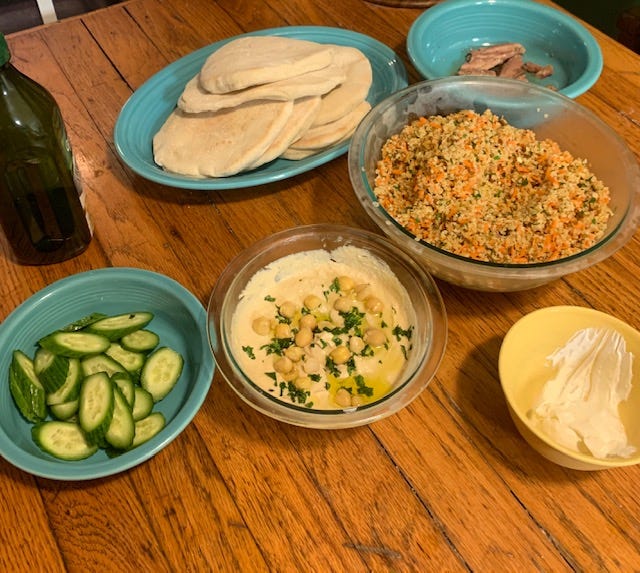I’ve been thinking about language lately. Really, since I moved back home. It’s not so much the return to my vocabulary of useful words and phrases like y’all and fixin’ to, or even the slow, steady softening of my accent into something more obviously Southern again. Those attributes were always there, even if others didn’t notice them. They were ready to rise to the surface quickly in the right context, and so they did not surprise me, or require contemplation.
I’m really talking more about words, their meanings, and how they’re used or not used in conversation or argument (or the lack of argument.) An admittedly silly and recent example of this: people here have been asking for restaurants with “good, home cooking.” I’ve never seen anyone anywhere refer to a restaurant meal as “home-cooking.” It’s grammatically impossible. A home-cooked meal is cooked at home. Anything cooked in a restaurant is restaurant-cooked. It felt to me like an odd language tic, something regional. I wondered what people meant by it, but it seemed to be one of those phrases people were using without thinking about it: everyone knows what it means, without ever really knowing what it means. This is not at all a big deal, but it’s one of the many weird language habits that sometimes make me feel like a stranger here. (Below is actual home-cooked pita, hummus, bulgur salad, and salted cucumbers. I also tried to make labneh, at which I mostly failed.)
This is only my most recent language hurdle. When I first moved here, I kept seeing and hearing people refer to things as “common sense.” People have no common sense. If you get too much of an education, you lose your common sense. I thought they meant practical knowledge, like knowing how to change a tire, but it’s application was broader. A lot of the actions President Donald Trump took were deemed common sense. Speakers used “common sense” to refer to their policy preferences. When the pandemic hit and we created an intentional economic recession by closing everything down, many people thought it was “common sense” to reduce government spending as well. That is not common sense at all. In that particular case, “common sense” was actually just ideology flooding into a vacuum created by a lack of knowledge about macroeconomics. I asked someone what they meant by “common sense” once, and he replied, only, “I can’t imagine anyone not knowing what common sense means!” and didn’t answer. Maybe educated people “lose their common sense” because they learn that a widely held assumption they encountered in their youth was actually not true.
The same problems crop up when people use the word “opinion.” “That’s just my opinion!” is a get-out-of-argument device. “I can’t imagine arguing with someone over their opinions!” But this often follows even something presented as fact, something that is usually false. It’s the antithesis of debate. People don’t like to argue, and think argument is a bad word, one which always means “fight.” It’s all seen as childish, for some reason, and childish is another word that isn’t defined. People call national politicians childish when they can’t come to an agreement or compromise. After I wrote about the local library issue for The New York Times, someone here accused me of lying to people, an accusation I took seriously, especially because the piece had been rigorously fact-checked and I’d stayed in touch with most of my sources as soon as it was published. But when I asked her about it, she showed me comments by people who were upset about what I’d written and disagreed with me. That is a very different thing from lying to people, especially in a journalistic capacity. A frequent complaint about liberals is that they just care about using the “right” words, and if you use the wrong one they’ll attack you for no reason. “Racism” has no meaning and is just used as a weapon to divide. Same with “sexism.” This was all part of Trump’s appeal: Trump was not careful with language, and offered a reprieve from thinking about it.
These issues, about words and their meanings and how they’re used, had been banging around in my head for awhile. It seemed key to understanding the Trump era that some people refuse to engage with the meaning of words, the identification of facts, and what is required to justify or defend a position. Sometimes, as a writer, something nibbles at the corners of your consciousness until you see someone else write about it and describe it better than you could. For me, that happened this week when I read Hamilton Nolan’s essay in In These Times. In political discourse today, he wrote, words are tossed around without meaning, or without an agreed upon meaning.
The absurd effect of this failure is twofold. First, it allows bad faith political actors to purposely exploit this rhetorical vulnerability in order to smear the other side by inflating the definition of bad things to include whatever the other side is doing. This is standard issue political scumbag behavior, and is to be expected. Worse, though, it creates a self-reinforcing cycle in which widespread use of some vague, ill-defined term convinces the public that this term is something important, driving media coverage and creating impenetrable towers of meaninglessness that come to dominate our partisan political landscape.
If you can push a bullshit issue into “everybody knows” territory, you can get away with never having to define it at all. What does it mean? Stupid question. Everybody knows this is an issue.
This is happening today, he writes, with words and phrases like “woke,” “cancel culture,” and “Critical Race Theory.” When the political press gets roped into this activity, it becomes something much worse, though. There shouldn’t be a news story about these terms, these debates, without defining them clearly. Not everything is just discourse: there are discoverable facts and meanings that reporters should work to get to the bottom of. That kind of precision, the exactitude with which a copy editor questions you late into the night long after you want to scream and run away from the story you’ve written, or thought you’d written, is a fundamental building block of journalism. You can’t use a word if it doesn’t mean what you’re trying to make it mean. You can have hours-long discussions about these technicalities because they are important. The final rounds of edits on any article used to involve poring over these minute distinctions. This is the reason using a phrase like “home-cooking” to describe restaurant food bothers me, and why I can’t let it go. Organic shifts in communication tell you something about the culture you’re in. Not everyone needs to be as careful with their language as a journalist or writer is, but we should expect that, at some basic level in society, words have meaning. While language changes and nuances shift over time, one of the functions of civilization is making thoughtful choices about where we’re going with our words and the ways they’re used.
What I’m Reading:
I really identified with this post from Lyz Lenz, about a troubling meme I’d also seen floating around and that had bothered me. I finally finished Dying of Whiteness, and realized Jonathan M. Metzl and I have been pulling at the same threads. This, from Tim Kreider on not wanting to re-enter society after the pandemic, is very me. To be honest I withdrew from society before the pandemic. New York City has bird paramedics. The U.S. drinks alcohol in all the wrong ways.
Cute Animal Pic of the Week:
I’ve mastered the art of sitting on the ground and making fart noises so that I get good pictures of adoptable dogs. This is Princess.




